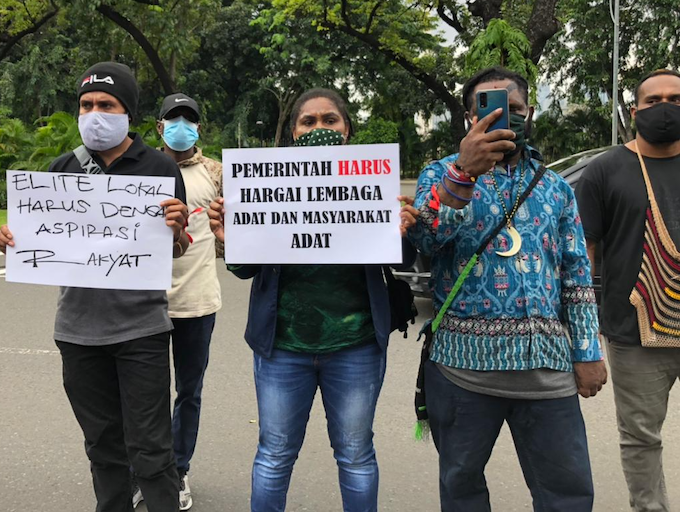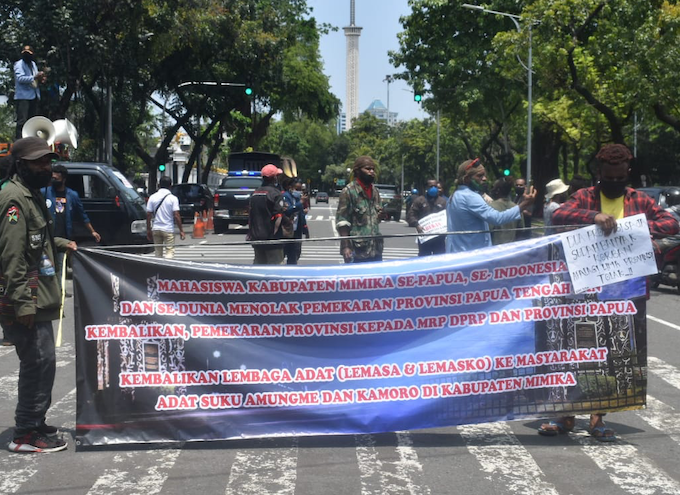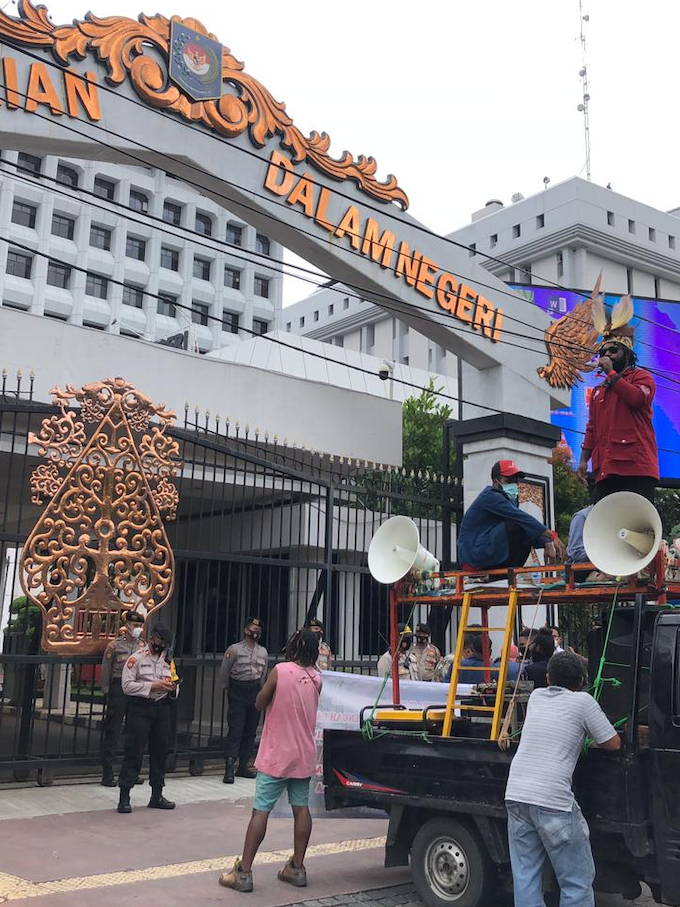
The indigenous people of West Papua have rejected the extension of special autonomy and the planned expansion of new provinces announced by the central government of Indonesia.
The rejection comes from grassroots communities across West Papua and Papuan students who are studying in Indonesia and overseas.
Responding to the expansion of a new province, Mimika students demonstrated in front of the Ministry of Home Affairs, Jl. Medan Merdeka Utara, central Jakarta, this week.
- READ MORE: More than half million Papuans sign petition opposing Indonesia’s Special Autonomy extension
- Other West Papua reports
Representing Mimika students throughout Indonesia and abroad, about 30 students who are currently studying in Jakarta, took part in the protest on Monday.
A statement received by Asia Pacific Report said that the Mimika regency students throughout Papua, Indonesia, and globally rejected the division of the Central Papua province and return the provincial division to the MRP and DPRP of Papua Province, and return the customary institutions (LEMASA & LEMASKO) to the tribal and Kamoro indigenous communities in Mimika regency.
DPRP stands for Dewan Perwakilan Rakyat Papua (Papua People’s Representative Council) and MRP stands for Majelis Rakyat Papua (Papuan People’s Assembly). LEMASA stands for Lembaga Masyarakat Adat Suku Amungme (Indigenous Community Institution of Amungme Tribe). LEMASKO stands for Lemabaga Masyarakat Suku Komoro (Indigenous Community Institution of Komoro Tribe).
Jony Jangkup, general coordinator of students from Mimika regency said that they had previously taken action in Timika, but this was never followed up by the regional government, therefore they approached the Ministry of Home Affairs office.
‘Two major tribes’
“In Mimika, there are two major tribes, namely the Amungme and the Kamoro. However, in this area there is PT Freeport, which limits the movement of indigenous people of Papua.
“Apart from that, there were frequent repressive actions there. The Ministry of Home Affairs must communicate with the regent to encourage an open deliberation of the two institutions to regulate their customary territories and lands,” said Jangkup.
“We ask that the division of Central Papua Province not be carried out unilaterally between the central government and the regents of the Mapago customary area. We fully support the decision of the MRP and the Papuan provincial government,” said the statement.
The statement also said that if the central government in Jakarta did not follow up on their demands, the students would mobilise the masses in the region and occupy the centre of the government offices in Mimika and the head office of PT Freeport which is based in Mimika.
“We reject the declaration of the expansion of the Central Papua province, which was carried out by the regents and DPRD (Regency People’s Representative Council), LMA (Jakarta-backed indigenous people’s institutions) and stakeholders unilaterally on Thursday, February 4, 2021 in Mimika,” said the statement.
Creating new provinces
Previously, Tirto.id reported that the central government wanted to create three new provinces in Papua to bring the total to five. This expansion plan has actually been public for a long time.
Coordinating Minister for Political, Legal, and Security Affairs Mahfud MD refirrmed this plan after a meeting with the Chairman of the MPR (People’s Consultative Assembly) Bambang Soesatyo, Minister of Home Affairs Tito Karnavian, and representatives of the TNI-Polri at the MPR / DPR Building, Jakarta, on 11 September 2020.
Mahfud said this expansion was an order of Law Number 21 of 2001 concerning Special Autonomy for Papua Province.
“The affirmation of Article 76 concerning the division of Papua, which is planned to be divided into five, plus three from the current one,” he said.
Article 76 of the Special Autonomy Law states, ” The expansion of the Papua Province into provinces shall be carried out with the approval of the MRP and the DPRP giving close attention to the social-cultural unity, the readiness of the human resources, and the economic ability and development in the future.”
However, the Chairman of Papuan People’s Assembly, Timotius Murib, said the conditions in Article 76 would not be fulfilled because the plan to expand the province in Papua had been rejected.
Murib said President Joko “Jokowi” Widodo had never met them even though he had visited Papua several times.
Development ‘too top-down’
He said that development in Papua was too ‘top-down’. The President had not heard the aspirations of the indigenous people, in many ways, including the issue over this division.
The government had failed to develop Papua because activities were not controlled by the community or indigenous Papuans.
“It is also this ‘top-down’ development model that ultimately creates distrust from the Papuan people and makes the perception that Indonesia is gripping Papua even stronger,” he said.
He also criticised Papuans for being pro-pemekaran (expansion). He called them “a group that is indirectly committing genocide or eradicating indigenous Papuans in the Land of Papua.”
Meanwhile, Suara Papua reported that the Central Highlands of Papua Indonesia Student Alliance (AMPTPI) had issued a motion of no confidence to the chairman of the Papua DPR (Papua People’s Representative Council).
The motion was over the fact that the institution was not pro-Papuan.
AMPTPI secretary-general Ambrosius Mulait said his party gave the motion of no-confidence to the Chairman of the Papua DPRP, which ignores and contradicts the aspirations of the Papuan people.

Discriminatory policies
“The Papuan people have a “Memoria Passionist” because of Jakarta’s policies which are discriminatory and racist against Papuans. If the legislature is not true, this is the impression that will give the people,” he said.
“The good thing is that the chairperson of the Papua DPRP resigns respectfully, so as not to have a bad impact on the fate of the Papuan people in the future.”
He said that the provincial government and the chairperson of the DPRP, as branches of the central government, should not ignore the aspirations of the Papuan people.
The regional government should have acted as a bridge in following up the aspirations of the Papuan people related to the rejection of the extension of Special Autonomy and the expansion of New Autonomous Region in Papua, he said.
Mulait said that efforts to solve problems in Papua in a holistic manner but out of sync with the legislative conditions would give a bad impression to the Papuan people.
“The DPRP must accommodate the aspirations of the people, not the aspirations of certain groups that appear to be detrimental to the people. The destruction within the Papuan DPRP member fraction is a manifestation of the inability of the legislature to carry out the oversight and control function over government policies,” said Mulait.
He said that the two camps in the Papua Legislative Internal Affairs gave a bad impression about the history of the Papuan Parliament.
The chairman of the Papua DPRP is able to summarise all factions because since he was appointed as a member of the Papua DPRP, no new breakthroughs have been made. The impact of the two camps in the DPRP Papua has had a bad political effect on Papuans.
This report has been compiled by a special West Papuan correspondent drawing on Papuan media reports.












































